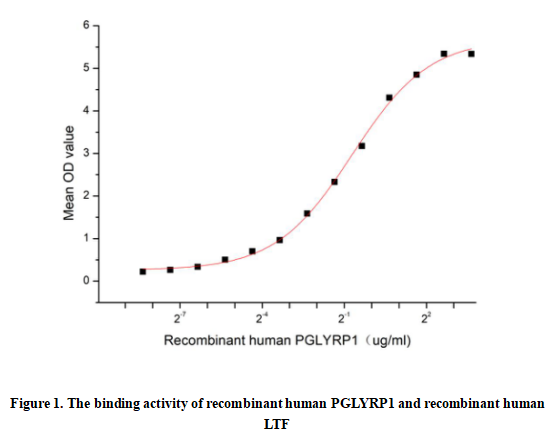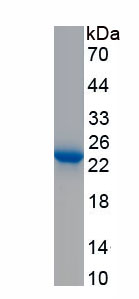Active Peptidoglycan Recognition Protein 1 (PGLYRP1)
PGLYRP; PGRP; PGRP-S; PGRPS; TAG7; TNFSF3L; Tumor Necrosis Factor Ligand Superfamily Member 3 Like; Peptidoglycan recognition protein short
- Product No.APD937Hu01
- Organism SpeciesHomo sapiens (Human) Same name, Different species.
- Buffer FormulationPBS, pH7.4, containing 0.01% SKL, 5% Trehalose.
- Traits Freeze-dried powder
- Purity> 95%
- Isoelectric Point8.5
- ApplicationsCell culture; Activity Assays.
- DownloadInstruction Manual
- UOM 10µg50µg 200µg 1mg 5mg
- FOB
US$ 184
US$ 460
US$ 920
US$ 2760
US$ 6900
For more details, please contact local distributors!
ACTIVITY TEST

Peptidoglycan Recognition Protein 1 (PGLYRP1) is a member of a family of proteins that recognize and bind to peptidoglycan, a major component of bacterial cell walls. PGLYRP1 helps defend against bacterial infections by recognizing peptidoglycans and participating in the host's immune response. It plays an important role in the immune system, activating immune cells, promoting inflammatory responses, and directly destroying bacterial cell walls. Besides, Lactoferrin (LTF) has been identified as an interactor of PGLYRP1, thus a functional binding ELISA assay was conducted to detect the interaction of recombinant human PGLYRP1 and recombinant human LTF. Briefly, PGLYRP1 was diluted serially in PBS with 0.01% BSA (pH 7.4). Duplicate samples of 100 μl were then transferred to LTF-coated microtiter wells and incubated for 1h at 37℃. Wells were washed with PBST and incubated for 1h with anti-PGLYRP1 pAb, then aspirated and washed 3 times. After incubation with HRP labelled secondary antibody for 1h at 37℃, wells were aspirated and washed 5 times. With the addition of substrate solution, wells were incubated 15-25 minutes at 37℃. Finally, add 50 µL stop solution to the wells and read at 450/630 nm immediately. The binding activity of recombinant human PGLYRP1 and recombinant human LTF was shown in Figure 1, the EC50 for this effect is 0.61 ug/mL.
USAGE
Reconstitute in 10mM PBS (pH7.4) to a concentration of 0.1-1.0 mg/mL. Do not vortex.
STORAGE
Avoid repeated freeze/thaw cycles. Store at 2-8°C for one month. Aliquot and store at -80°C for 12 months.
STABILITY
The thermal stability is described by the loss rate. The loss rate was determined by accelerated thermal degradation test, that is, incubate the protein at 37°C for 48h, and no obvious degradation and precipitation were observed. The loss rate is less than 5% within the expiration date under appropriate storage condition.
GIVEAWAYS
INCREMENT SERVICES
-
 BCA Protein Quantification Kit
BCA Protein Quantification Kit
-
 Molecular Mass Marker for Protein
Molecular Mass Marker for Protein
-
 Monoclonal Antibody Customized Service
Monoclonal Antibody Customized Service
-
 Polyclonal Antibody Customized Service
Polyclonal Antibody Customized Service
-
 Protein Activity Test Experiment Service
Protein Activity Test Experiment Service
-
 Electrophoretic Mobility Shift Assay (EMSA) Experiment Service
Electrophoretic Mobility Shift Assay (EMSA) Experiment Service
-
 Buffer
Buffer
-
 Lentivirus Packaging Experiment Service
Lentivirus Packaging Experiment Service
-
 Adenovirus Packaging Experiment Service
Adenovirus Packaging Experiment Service
-
 Real Time PCR Experimental Service
Real Time PCR Experimental Service
-
 Spike RBD Protein (S-RBD)
Spike RBD Protein (S-RBD)
-
 Protein G
Protein G
-
 Protein A
Protein A
| Magazine | Citations |
| Molecular Medicine Reports | Serum PGLYRP‑1 is a highly discriminatory biomarker for the diagnosis of rheumatoid arthritis Pubmed: 30431075 |
| International journal of clinical and experimental medicine | Elevated expression of Pglyrp1 in peripheral blood mononuclear cells and PGLYRP-1 in serum from systemic lupus erythematosus patients |
| Catalog No. | Related products for research use of Homo sapiens (Human) Organism species | Applications (RESEARCH USE ONLY!) |
| APD937Hu01 | Active Peptidoglycan Recognition Protein 1 (PGLYRP1) | Cell culture; Activity Assays. |
| RPD937Hu01 | Recombinant Peptidoglycan Recognition Protein 1 (PGLYRP1) | Positive Control; Immunogen; SDS-PAGE; WB. |
| PAD937Hu01 | Polyclonal Antibody to Peptidoglycan Recognition Protein 1 (PGLYRP1) | WB; IHC |
| MAD937Hu21 | Monoclonal Antibody to Peptidoglycan Recognition Protein 1 (PGLYRP1) | WB; IHC; ICC; IP. |
| SED937Hu | ELISA Kit for Peptidoglycan Recognition Protein 1 (PGLYRP1) | Enzyme-linked immunosorbent assay for Antigen Detection. |
| LMD937Hu | Multiplex Assay Kit for Peptidoglycan Recognition Protein 1 (PGLYRP1) ,etc. by FLIA (Flow Luminescence Immunoassay) | FLIA Kit for Antigen Detection. |







